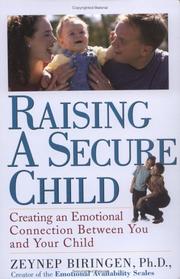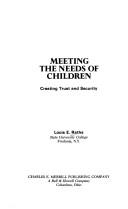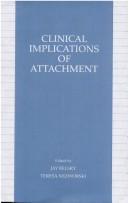| Listing 1 - 4 of 4 |
Sort by
|

ISBN: 0399529942 Year: 2004 Publisher: New York Perigee Books
Abstract | Keywords | Export | Availability | Bookmark
 Loading...
Loading...Choose an application
- Reference Manager
- EndNote
- RefWorks (Direct export to RefWorks)
Child rearing --- Parent and child --- Security (Psychology) in children

ISBN: 0675091306 Year: 1972 Publisher: Columbus Merrill
Abstract | Keywords | Export | Availability | Bookmark
 Loading...
Loading...Choose an application
- Reference Manager
- EndNote
- RefWorks (Direct export to RefWorks)

Abstract | Keywords | Export | Availability | Bookmark
 Loading...
Loading...Choose an application
- Reference Manager
- EndNote
- RefWorks (Direct export to RefWorks)
Attachment behavior in children --- Mental illness --- Mother and child --- Security (Psychology) in children --- Child Behavior Disorders --- Mother-Child Relations --- Object Attachment --- Forecasting --- etiology
Book
ISBN: 0520959728 9780520959729 9780520278097 0520278097 9780520278103 0520278100 Year: 2014 Publisher: Oakland, California
Abstract | Keywords | Export | Availability | Bookmark
 Loading...
Loading...Choose an application
- Reference Manager
- EndNote
- RefWorks (Direct export to RefWorks)
In a time of economic anxiety, fear of terrorism, and marital uncertainty, insecurity has become a big part of life for many American mothers. With bases of security far from guaranteed, mothers are often seeking something they can count on. In this beautifully written and accessible book, Ana Villalobos shows how mothers frequently rely on the one thing that seems sure to them: the mother-child relationship. Based on over one hundred interviews with and observations of mothers-single or married, but all experiencing varying forms of insecurity in their lives-Villalobos finds that mothers overwhelmingly expect the mothering relationship to "make it all better" for themselves and their children. But there is a price to pay for loading this single relationship with such high expectations. Using detailed case studies, Villalobos shows how women's Herculean attempts to create various kinds of security through mothering often backfire, thereby exhausting mothers, deflecting their focus from other possible sources of security, and creating more stress. That stress is further exacerbated by dominant ideals about "good" mothering-ideals that are fraught with societal pressures and expectations that reach well beyond what mothers can actually do for their children. Pointing to hopeful alternatives, Villalobos shows how more realistic expectations about motherhood lead remarkably to greater security in families by prompting mothers to cast broader security nets, making conditions less stressful and-just as significantly-bringing greater joy in mothering.
Mother and child. --- Motherhood. --- Security (Psychology) in children. --- Security (Psychology). --- Motherhood --- Mother and child --- Security (Psychology) in children --- Security (Psychology) --- Sociology & Social History --- Social Sciences --- Family & Marriage --- Emotional insecurity --- Emotional security --- Insecurity (Psychology) --- Psychology, Applied --- Child psychology --- Child and mother --- Mother-child relationship --- Mothers and children --- Parent and child --- Maternity --- Mothers --- Parenthood --- 21st century american culture. --- american culture. --- american mothers. --- economic anxiety. --- family. --- gender and women studies. --- gender studies. --- good mothering. --- human condition. --- insecurity. --- joy. --- marital uncertainty. --- marriage and divorce. --- mother and child. --- mother child relationship. --- motherhood. --- mothering. --- parent and child. --- parenthood. --- parenting. --- realistic expectations of motherhood. --- realistic. --- security in family. --- security nets. --- single mothers. --- social pressures. --- stress. --- terrorism. --- womanhood.
| Listing 1 - 4 of 4 |
Sort by
|

 Search
Search Feedback
Feedback About UniCat
About UniCat  Help
Help News
News